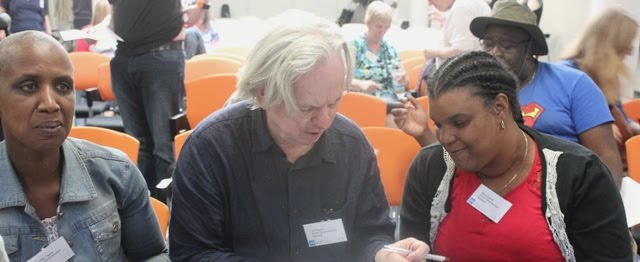By Victoria Brignell.
Member of Hammersmith and Fulham’s Disabled People’s Commission
A quiet revolution is currently underway in Hammersmith and Fulham. Most of its residents will be unaware of it so far but behind the
scenes much activity is taking place.
 |
| Victoria with former Mayor of Hammersmith and Fulham Mercy Umeh |
Steve Cowan, Leader of Hammersmith & Fulham Council,
wants to make this West London borough the best place in the country to be
disabled. This is a bold ambition in itself but the way the council intends to
achieve it is pioneering.
In what is widely believed to be the first initiative of its
kind, the council is not just consulting disabled people about what they want
but planning to actively involve them in the decision-making processes. This is a
concept known as co-production and it is based on the principle that those who
use a service are best placed to help design it.
The 2014 Care Act
encouraged local authorities to adopt co-production
…but I believe that Hammersmith and Fulham Council is
taking it more seriously than most. As a first step, it has set up a Disabled
People’s Commission (DPC) to draw up a list of recommendations on how co-production
should work in practice.
Made up of ten local disabled people with a range of impairments,
the DPC has been meeting since last September and taking evidence from local disabled
person-led organisations and co‑production advisors. At the heart of its work
is the social model of disability; the idea that people are disabled not by
their impairment but by others' attitudes and also by the way society is organised.
The DPC has already
carried out a major survey of residents
…and held a public event in the borough to find out disabled
people's views and what issues they think need tackling. The message emerging
is loud and clear – disabled people believe services could be better and want a
greater say in how they are designed and delivered.
More than 60% of the disabled people surveyed believed that
their quality of life had gone down and 43% had had difficulty using a service
in the last 12 months. Moreover, 46% felt that they could not currently
influence decisions that affected them. As one respondent said: "Nobody
has ever asked me about who I am or what I need".
DPC member David Isaac tells me: "Change has to happen
from top to bottom, from the policymakers and managers right down to the
frontline staff. Even with the best intentions, people are making decisions for
disabled people, not with them - and that causes more harm than good."
Disabled people are under-represented at all levels of
government, from local authorities to Parliament and the Cabinet. While it is
vital to increase the number of disabled people elected to public office, this
will take many years to achieve. In the meantime, co-production offers a way to
incorporate disabled people into the way public bodies carry out their work.
Will co-production
ever become a reality in Hammersmith and Fulham?
Early signs are encouraging. In the DPC's survey, over 80%
of disabled people said they wanted to participate in council decision-making
and 94% of council staff were keen to involve disabled residents more in the
delivery of services. DPC members are planning to hold an event in Co-production
Week to explore the idea further with Hammersmith and Fulham Council staff.
The DPC is due to publish its final report early in 2018.
It is determined to do what it can to make a difference and transform services.
However, whether Hammersmith and Fulham Council manages to create a real and
enduring partnership between those providing services - and those using them - only
time will tell.

No comments:
Post a Comment